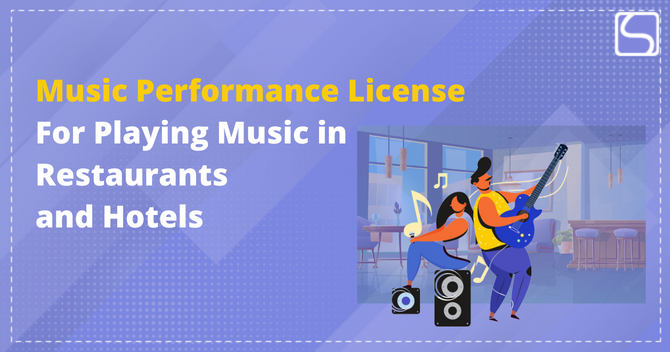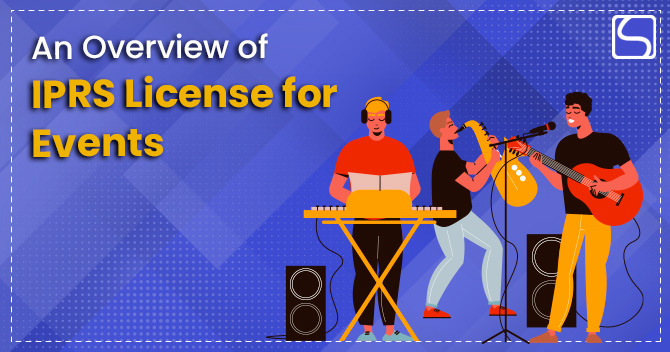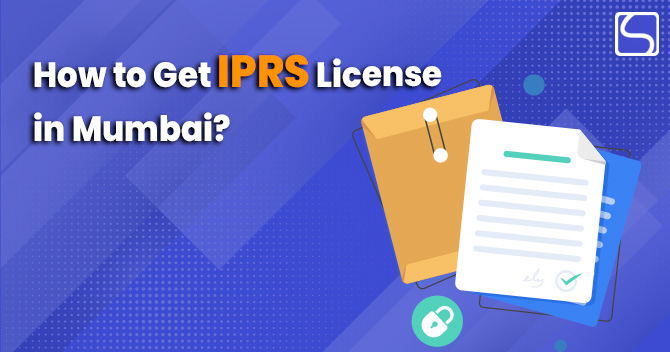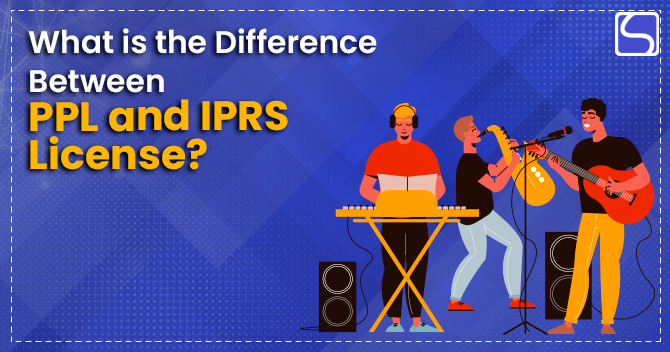Music Performance License: For playing music in Restaurants and Hotels

Ganesh Nair | Updated: Aug 29, 2022 | Category: Music License
Listening to music is a calm, relaxing and soothing experience. Hence it is found everywhere in personal devices/spaces and in public areas such as malls, restaurants, pubs etc. it has become an inseparable part of our lives. But unlike listening to music on a personal level, a person must have a Music Performance License to play music in commercial spaces.
The copyright act of 1957 states that a person must have a Performance License, entertainment license and Public Performance License to play pre-recorded music or live music in commercial spaces. The license is granted by Phonographic Performance Limited (PPL) India. However, if the entity wants to make public performances or live performances, then it needs to get the (Indian Performing Rights Society) IPRS license.
Table of Contents
Why is a Music Performance License required?
Whenever music is played without any sort of royalty being paid to the owner of the music, then it amounts to copyright infringement. Many music creators/owners/producers suffer huge losses when a third party uses their product. That’s why Music Performance License is essential if you want to play music in a commercial area such as a restaurant, club, online streaming radio, etc. A public performance license is required irrespective of the portion of the song used. In the cases of live performance, the license is granted by the IPRS.
Which Establishments require a Music Performance License?
- Any performance at a public place that includes event venues, banquet halls, malls, pubs, restaurants other public places requires a Music License.
- If someone is performing copyrighted material and it is being broadcasted on television or radio, then the entity must have a music license.
- Any sort of music that is being streamed online on interactive or non-interactive platforms requires a music license.
- If a telecom operator needs to add any song as a caller tune.
- Music Licenses are required for any live performances that might take place at your venue.
- The advertising agency should have the requisite music license if the music is being used in commercials.
Benefits of Music Performance license
- Compliance with laws: once an entity obtains a musical license, it will be compiled with the government norms and give the royalty to the owner of that piece of music
- Public performances: Live music and public performances tend to attract a large number of customers. More considerable footfall shall increase the business’s revenue and reputation.
- Popularity: More live shows shall enable the business to host different artists and shows. This will increase the popularity of the place organically.
- Payment to the original artist: by Music performance license shall let the businesses comply with regulations. So the artists shall be paid a royalty for their music, and their copyright won’t be infringed.
Forms of License:
- Public performance license:
A PPL is opted for by restaurants and hotels when an artist comes to their premises for a public performance. This license is used in the cases of live concerts or performances. This is one of the general licenses which the entities usually purchase. It also comes in handy when music is played through some Jukebox as well.
- Master License:
This license is used by people who want to incorporate copyrighted audio into their audio-visual projects. The original producer of the music permits the entities to use his music. But this license does not grant permission to re-record a song in form or process.
- Mechanical License:
This license is used solely for commercial purposes. In this, the artist is paid compensation by the company that agrees to do the distribution of the original songs in the form of CDs, streaming platforms etc. if a person wants to make changes to the original components, such as remixing the song, changing the lyrics or making any other musical changes then he must have a Mechanical License.
- Synchronisation License:
These licenses are required when someone has to play the song and sync it with some visuals. Such licenses are used by advertisers, film studios, TV commercial agencies and so on.
What are the parameters on which the Music license is acquired?
- The parameters on which the music license is acquired:
- The range of music
- The extent of area till which the music is audible this must be specified in m2
- The total capacity of the venue where the music is to be played
- The type of area where the music shall be played- dining area, washrooms, kitchens etc.
- The device being used to play the music- TVs, amplifiers, CD players etc.
What are the exceptions?
- There are a few exceptions to obtaining the music license these are:
- If music is played as per the curriculum of amateur clubs, that is not gaining profit from such activities.
- If you own a music shop and you are playing the music in your own store just as a promotional activity.
- An eatery/ store can play the originally composed song by the person performing it.
- If the restaurant’s area is less than 5000sq. ft. then it can be played via TV or Radio.
Documents required for Music Performance License
- Documents for the proof of address, name and nationality
- Documents showing details of the business
- A comprehensive list of the type of music to be played by the entity
- If the business is an LLP- then it must furnish the certificate of incorporation
- PAN card of the owner
- Certificate of GST registration
- Bills such as electricity, driver’s license, voter ID, Aadhar card etc. for proof of address
Process of Registration for Music Performance License
- Go to the official website: The applicant can go to the www.IPRS.org website if they require a public/ Live performance license[1]. IPRS also hand out licenses based on your business requirements- they have licenses for streaming sites, commercial spaces, Hotels etc. Alternatively, the applicant may choose to avail license from www.ppplindia.org. The license can be acquired based on the customer’s requirement.
- Selection of License: once the applicant visits the website, he has to select the type of music license per his needs. The applicant must register on the website and create an account. The site specifies various categories through which the applicant needs to browse through various sections and select the one he thinks is the best for his business.
- Provide necessary documents and details: The applicant must share necessary documents such as the ones stated above as and when prompted on the site.
- Submit application: once the application is completed, it can be submitted online through the portal. The applicant needs to fill in his email and Mobile number to obtain an OTP. If all the criteria are met, then the process of application shall be completed and the license granted.
- Essential details on Terms and Conditions:
The request for a license must be in compliance with IPRS norms.
- The license shall be issued against an Annual fee.
- If the license holder fails to pay the fee on time, then he shall be charged a penalty of 18% of the license fee.
- If rules related to the license are not complied with, then a penalty of 30% would be applied.
Punishment:
- If a person is found infringing the copyright of any person, then he shall be liable for
- Imprisonment for a period of six months which may be extended to three years.
- A Fine that shall not be less than Rs 50,000 may extend to Rs. 2 00,000. As per section 63 of the Copyright Act 1957.
- The offender can be barred from playing music for six months, which can also be extended up to 2 years.
Conclusion:
A music Performance license is essential for all entities that want to play music in public areas or commercial spaces. Acquiring a music license makes the entity compliant with the law and ensures that the artists’ copyright is not violated. Such licenses can be availed easily through online portals upon paying an annual fee. If the entity does not obtain a music license, then it shall be held violating S.63 of the Copyright Act.














